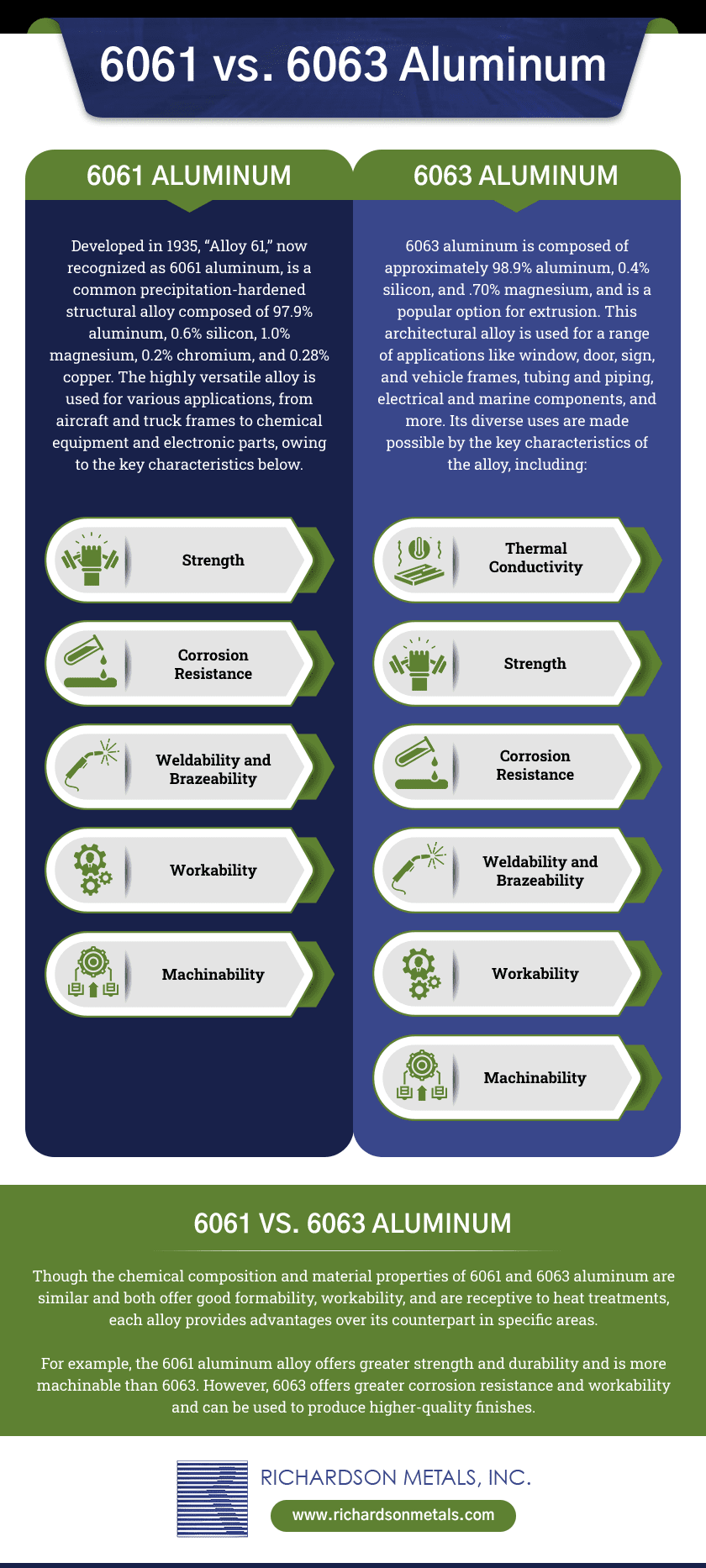Richardson Metals, Inc. has been a nationwide supplier of aluminum, aluminum extrusions, and a myriad of other material components since 1980. With a team focused on product quality and customer satisfaction, Richardson Metals offers custom aluminum extrusions, extruded metal shapes, aluminum machining, and related value-added services like finishing, prototyping, and specialty production. Two of the primary grades of aluminum we use are alloys 6061 and 6063.
6061 Aluminum
Developed in 1935, “Alloy 61,” now recognized as 6061 aluminum, is a common precipitation-hardened structural alloy composed of 97.9% aluminum, 0.6% silicon, 1.0% magnesium, 0.2% chromium, and 0.28% copper. The highly versatile alloy is used for various applications, from aircraft and truck frames to chemical equipment and electronic parts, owing to the key characteristics below.
- Strength: The tempering and aging of 6061 aluminum create a stronger alloy, with average ultimate tensile strength ranging from approximately 241 MPa to 310 MPa, and yield strength from 145 MPa to greater than 276 MPa.
- Corrosion resistance: Exposure to air triggers 6061 aluminum to form a layer of oxide that protects lower layers of metal and minimizes its reaction to corrosive elements.
- Weldability and brazeability: 6061 aluminum is weldable by all methods with the use of appropriate complementary filler alloys to prevent cracking, and is also furnace brazeable.
- Workability: Classified as a wrought alloy containing <4% of alloying elements, annealed 6061 aluminum offers good workability.
- Machinability: 6061 is the most commonly machined aluminum alloy due to its litany of desirable mechanical properties for the process; it carries a machinability rating of 90% when compared to 2011 aluminum, an alloy known for excellent machinability.
6063 Aluminum
6063 aluminum is composed of approximately 98.9% aluminum, 0.4% silicon, and .70% magnesium, and is a popular option for extrusion. This architectural alloy is used for a range of applications like window, door, sign, and vehicle frames, tubing and piping, electrical and marine components, and more. Its diverse uses are made possible by the key characteristics of the alloy, including:
- Thermal conductivity: The alloy has a coefficient of thermal expansion from 21.8 μm/m-° C and displays thermal conductivity from 200 W/m-K to 209 W/m-K.
- Strength: Like other 6XXX series alloys, 6063 aluminum undergoes tempering and aging to improve strength, offering average ultimate tensile strength ranging from approximately 186 MPa to 290 MPa, yield strength from 145 MPa to 269 MPa.
- Corrosion resistance: The lack of copper in the chemical composition of 6063 aluminum improves corrosion resistance over other 6XXX series alloys.
- Weldability and brazeability: Used alongside the correct filler alloys, 6063 aluminum can be welded and brazed using all conventional methods.
- Workability: Aluminum 6063 offers greater workability than other 6XXX alloys and is easier to form into complex shapes with high-quality surface finishes.
- Machinability: The 6063 aluminum alloy has a machinability rating of 80% compared to 2011 aluminum, an alloy offering excellent machinability.
6061 vs. 6063 Aluminum
Though the chemical composition and material properties of 6061 and 6063 aluminum are similar and both offer good formability, workability, and are receptive to heat treatments, each alloy provides advantages over its counterpart in specific areas.
For example, the 6061 aluminum alloy offers greater strength and durability and is more machinable than 6063. However, 6063 offers greater corrosion resistance and workability and can be used to produce higher-quality finishes.
When selecting the appropriate alloy for production, the primary factors for consideration will depend on the final product’s integrity and longevity requirements.
Aluminum Guidance From Richardson Metals
Aluminum grades 6061 and 6063 come with a variety of advantages over other aluminum alloys. While similar, the materials have some distinct differences that make them more suitable for specific applications—like structural work for 6061 and architectural finishes for 6063.
For more information on the aluminum services at Richardson Metals or for guidance in selecting the correct aluminum grade for your next project, request a quote or contact us today.

